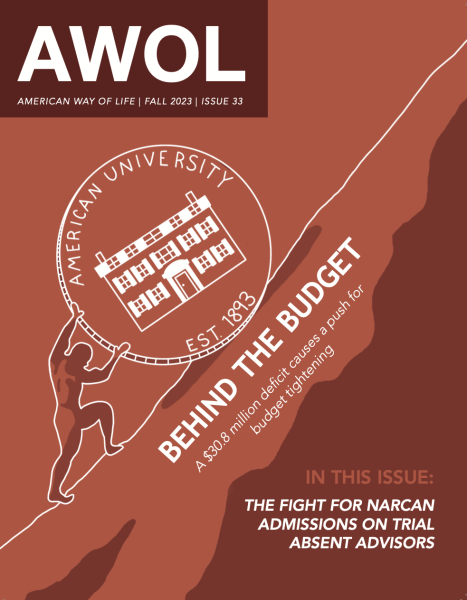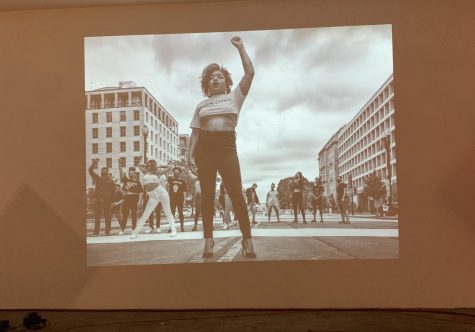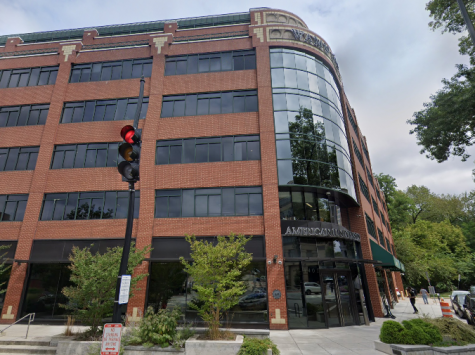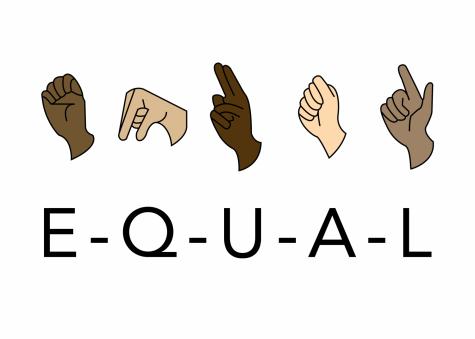Fighting for Workers’ Rights One Protest at a Time
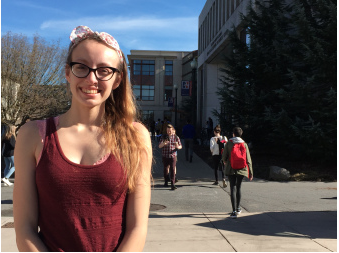
Emma-Claire Martin, a junior at American University and President of Student-Worker Alliance.
Emma-Claire Martin has been fighting the food service company Aramark since she was young. In the seventh grade, Martin marched to a school board meeting at her Rutledge, Pennsylvania middle school with a power point presentation demanding healthier food from Aramark, who catered their lunches.
“We need more salads,” Martin said in her presentation. Her voice was ignored and Aramark changed nothing at her school.
Leaving her hometown to attend college did not allow her to escape the company.
“I come to college, and I see American University has Aramark, and I am like, ‘ugh, these guys,’” Martin said.
“I found out not serving healthy food wasn’t [Aramark’s] biggest injustice,” Martin said, referring to the company’s mistreatment of its workers. “It actually ran deeper; it was much more serious.”
Wanting to combat these grievances, Martin joined the Student-Worker Alliance (SWA) in her first year of college. Her friend Rachel brought her to one of the meetings the campus organization held and Martin became hooked.
SWA is a social justice organization that advocates for worker rights at AU.
Now a junior studying film, religious studies and sexuality studies, Martin is the president of the SWA.
“The mission of the Student-Worker Alliance is to listen to the housing and dining workers on campus, their grievances, their complaints, what they want to be better,” Martin said. Martin added that SWA recognizes AU is the students’ home as well as all the faculty, professors, staff and workers’.
“This campus needs to be a safe and a welcoming space,” Martin said.
How SWA works
SWA meets with housing and dining staff to discuss workers’ concerns and plans of action to improve their working conditions. These actions include boycotts, petition signing or protests. SWA makes sure not to speak for the workers.
“We work to make sure their voice is heard,” Martin said. “Our role is to empower [the workers].”
SWA is particularly important because student involvement allows workers to speak up about workplace injustice. Martin says there’s fear that if workers speak up, they might get fired or suffer other workplace penalties.
“That has definitely prevented a lot workers from speaking up,” Martin said. “The SWA exists so that doesn’t happen. If workers speak out and get fired, SWA is determined to protest and boycott, Martin said. “We want to be a safety net for [workers].”
Martin added that AU ismore inclined to listen to students’ voices more than the workers’.
“We’re the ones giving [AU] money,” Martin added. “If the students are angry enough about an issue, it’s more likely to see change than if it’s just the workers.”
Last year, according to Martin, the SWA advocated for floor mats for Subway workers to stand on. They were successful: SWA mobilized students to obtain mats that provided workers with a more comfortable working environment.
Although workers can go to their managers to voice their concerns, Martin said problems can slip through the cracks in the hierarchy since there are no consequences for not giving workers what they want.
“If you’re trying to make money, if you’re just trying to run a university, and you’re not particularly caring [about] the human rights issue,” Martin said, “there’s no real consequence.”
Faith and activism
Martin said her social justice activism is deeply rooted in her Christian faith.
Martin joined the United Methodist Student Association her freshman year. During her time there, she became interested in the association’s social justice initiatives and enjoyed the political activism discussions.
“Jesus was a super activist,” Martin said. “A lot of the Bible talks about standing up for the underdog and being angry at injustice.”
She added that Jesus preached against being greedy and in favor of giving time, energy and money to people who need it.
“Because I am a Christian, I feel I would be a hypocrite if I wasn’t every day looking to be an activist, to be an organizer, to use my platform as someone who has privilege to help however I can.”
‘Everybody can participate’
Martin said that an easy way for everyone to get involved in SWA efforts is to talk to workers.
“Ask how their day is going,” Martin said. “Strike up a conversation. Be friendly. Be appreciative. Get to know the people who are making your food.”
If students wish to take a more active role in the SWA efforts, they can join the organization.
“Student-Worker Alliance has two different levels of involvement,” Martin said. The first is the planning and the organizing of plans of action regarding issues presented to the SWA. This level entails commitment to responsibilities.
The second level is attending the SWA weekly meetings.
“You can come to meetings just to learn,” Martin said. “You can come to a rally.”
The rallies organized by SWA are open to everyone to attend.
“I encourage everyone to get involved in some small way,” Martin said.
Martin believes that everyone should be an activist, adding that when she learned about the injustices workers go through, “it’s impossible to be chill with it.”
“Oppression has no place in any good society,” Martin said.







